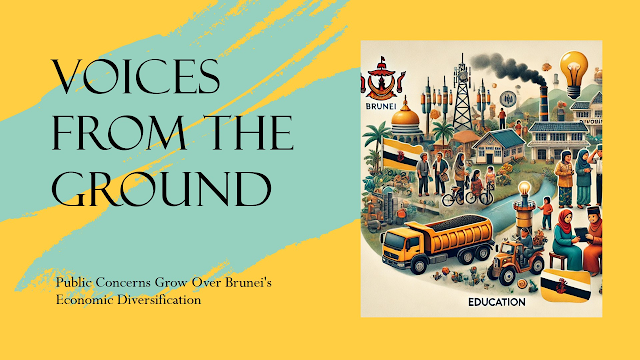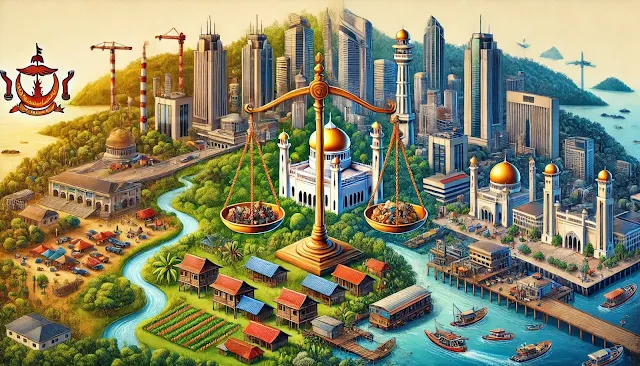Bruneians Demand Concrete Measures for Economic Diversification
As Brunei strives to achieve its ambitious vision of Wawasan 2035, the plan to transform the nation into a sustainable and dynamic economy, there is mounting public concern about the slow progress of economic diversification.
With heavy reliance on oil and gas, Brunei faces significant risks due to volatile global prices and finite resources.
Despite ongoing government efforts to promote diversification since the Fifth National Development Plan (1986-1990), tangible results have been elusive, sparking debates among concerned citizens.
Many Bruneians, even those without an economic or policy background, are observant of their country's economic landscape.
They strongly believe that investing in education and human capital development is crucial. While they appreciate free education, they question its quality.
As one observer aptly pointed out, "What's the point of education if it is of poor quality?"
Suggestions to enhance the education system include upgrading teacher training, increasing salaries, and improving school facilities.
Additionally, implementing a national school bus system to support full-day classes, especially for primary school children, is seen as greatly beneficial.
Brain drain is another pressing issue. Many Bruneians leave the country in search of better opportunities elsewhere.
"Grant citizenship to children born in Brunei to stateless parents and simplify the citizenship process," suggests one bystander.
Improving the quality of life, work-life balance, healthcare, education, and entertainment options is seen as essential for retaining local talent.
The business environment in Brunei often faces criticism for being excessively restrictive.
"Facilitate business operations. Remove unnecessary restrictions and simplify processes for small and medium enterprises (SMEs) and foreign direct investments (FDIs)," urges one citizen.
The financial system also needs to align with international standards, enabling seamless use of global payment methods like PayPal in Brunei.
However, doubts remain about Brunei's ability to compete with established financial hubs in the region, such as Singapore.
Quality healthcare is considered essential for a thriving nation. One resident emphasized the need for more clinics, doctors, nurses, and modern facilities.
It is crucial to increase healthcare professionals' salaries to international standards to attract and retain talent. Additionally, maintaining and improving existing infrastructure is a priority.
There have been calls to preserve the Brunei Museum, Tasek Merimbun ASEAN Heritage Site, and the BSB bus station, as well as ensure adequate water, electricity, and internet supply.
Shifting the population away from car ownership to public transportation is seen as a long-term goal, but one observer noted that achieving this could take longer for Brunei compared to Singapore's timeline of 30-50 years.
Reducing the financial burden of car ownership could free up household income for other purposes. Attracting foreign direct investment (FDI) and foreign talent is seen as pivotal.
Imagining a scenario where major companies like TSMC, Intel, or Toyota establish operations in Brunei, one citizen suggests that this could be a game-changer, providing scholarships and producing graduates for these industries.
Despite these well-articulated concerns and suggestions, there is a sense of disillusionment among the public.
"We are too busy arguing about what's right or wrong, and in the end, nothing gets done," lamented one observer. Budget constraints are another recurring issue.
"No budget doesn't mean we don't have money, but current budget allocations are insufficient," explained a concerned citizen.
Ministries often cite budgetary limitations as a reason for inaction, leading to frustration.
Moreover, the lack of a cohesive 'Whole of Government' and 'Whole of Nation' approach is criticized.
"Why are we discussing these critical issues on Reddit instead of public media?" asked one frustrated resident.
The inability to openly discuss economic stagnation reflects deeper issues within the governance framework.
As Brunei marches towards Wawasan 2035, the voices of its people underscore a collective desire for meaningful change.
Addressing education, the business environment, healthcare, infrastructure, and FDI with strategic investments and policy reforms could steer Brunei towards a more resilient and diversified economy.
Whether these aspirations translate into action remains to be seen, but the conversation is a crucial first step towards a brighter, more diversified future. (MHO/08/2024)


.jpeg)









